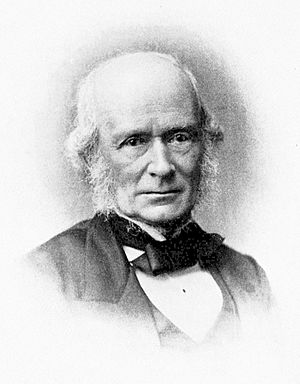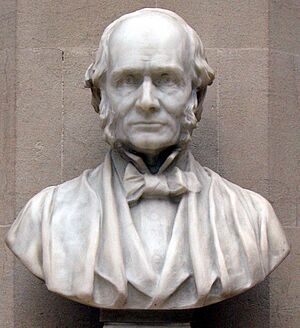Joseph Prestwich facts for kids
Quick facts for kids
Joseph Prestwich
|
|
|---|---|

Portrait of Prestwich published in The Popular Science Monthly
|
|
| Born | 12 March 1812 |
| Died | 23 June 1896 (aged 84) |
| Awards | Wollaston Medal (1849) Royal Medal (1865) |
Sir Joseph Prestwich (born March 12, 1812 – died June 23, 1896) was an important British geologist and businessman. He was known for being an expert on the Tertiary Period, a time in Earth's history. He also helped confirm that very old stone tools found in France proved that humans lived much longer ago than people thought.
Early Life and Discoveries
Joseph Prestwich was born in Clapham, England. He studied in Paris and Reading before going to University College, London. There, he learned about chemistry and natural philosophy, which is like early science.
In 1830, he started working for his family's wine business. This job made him travel a lot, both in the United Kingdom and to countries like France and Belgium. While traveling, he made many interesting observations about rocks and the Earth.
He became a member of the Geological Society in 1833. Two years later, he published his first scientific paper. His work in 1836 about the Geology of Coalbrookdale made him famous as a geologist.
Proving Ancient Humans
From 1846, Prestwich focused on the layers of rock from the Tertiary period in the London Basin. He studied these layers and connected them to similar rock formations across England, France, and Belgium.
In 1858, a friend named Hugh Falconer convinced Prestwich to visit Abbeville, France. A man named Boucher de Perthes had claimed to find flint tools (stone tools) in the gravel beds of the Somme valley. This was a big deal because it suggested that humans had lived there for a very long time, much earlier than people believed.
Prestwich, along with John Evans, visited the gravel beds at St Acheul. They confirmed that Boucher de Perthes' findings were true. Prestwich's report about this discovery was published in 1859-1860. Many experts believe this publication marked the beginning of modern scientific archaeology, which is the study of human history through digging up old things.

Later Career and Legacy
In the late 1860s, Prestwich worked on important government groups, including one about coal and another about London's water supply. From 1870 to 1872, he was the president of the Geological Society.
In 1874, he became a professor of geology at the University of Oxford. While there, he wrote a two-volume book called Geology, Chemical and Physical, Stratigraphical and Palaeontological.
Prestwich retired from Oxford in 1888 and moved to Shoreham in Kent. He continued his scientific work until he passed away in 1896.
He received many honors for his work:
- He became a member of the Royal Society in 1853.
- He was given the Royal Medal in 1865.
- He won a Telford Medal in 1873 for a paper about building a tunnel between England and France.
- He was elected a member of the American Philosophical Society in 1869.
- He was made a knight in 1896, which meant he could use "Sir" before his name.
In 1870, he married Grace Anne McCall, who was the niece of his friend Dr. Hugh Falconer.
 | Kyle Baker |
 | Joseph Yoakum |
 | Laura Wheeler Waring |
 | Henry Ossawa Tanner |

